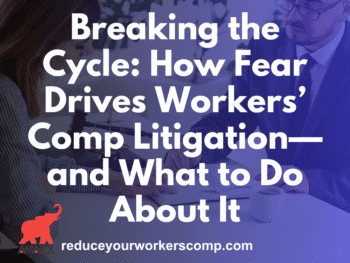In workers’ compensation claims, according to Attorney Theodore Ronca, the employer is nearly always represented by a lawyer selected or employed by the carrier. This practice is so common it is almost universally but falsely, believed the carrier has the sole right to select the attorneys. In fact, the defense lawyer’s client in workers’ compensation is the employer, not the carrier. Therefore, in the event of possible conflict, the employer must be advised of their right to select their own counsel. Question One: If the employer has an an attorney selected by the carrier, what is the employer entitled to receive in way of legal services? 1. At minimum, the attorney must first contact the employer and arrange for discussion of the issues on the claim under a confidential attorney-client privilege. The lawyer cannot communicate damaging confidential information to the carrier, as often happens with cases involving premium issues. 2. The attorney must stay in contact with the employer, communicating with them prior to each hearing or appeal. The attorney must advise the employer of their right to participate fully in hearings. If the carrier selects inappropriate assistance from investigators or medical personnel, the attorney must advise the employer and give the employer an opportunity to select others. 3. Unfortunately, these services are rarely provided. The attorney selected by the carrier may receive hundreds of claims a year from the carrier. Primary loyalties are clear. Some carriers even bar the attorney from contacting an employer at all. Question Two: What can an employer do? Communicate, communicate, communicate. When a workers’ compensation claim is reported, ask the carrier to provide the name of the firm handling the claim. Then, write to them (return receipt requested (RRR)) and arrange for conferences. Inform the lawyers in writing (again, return recepit requested) you would like a conference before and immediately after each hearing before the workers’ compensation board (WCB). Also request (in writing, return receipt) you be contacted before an appeal is written so you know the issues and the defenses. If a carrier refuses and/or a lawyer will not cooperate, again object in writing (RRR). Copies of these communications can be of incalculable worth to an employer hit with a rash of copy-cat claims driving premiums into the upper atmosphere. The value of employer communication with a carrier and lawyer was most dramatically demonstrated in a recent New York decision. A Board employee made a keystroke error placing the wrong carrier on notice. The error could have been quickly corrected by a phone call to the employer and a fax of its compensation policy sent to the Board and all parties. Instead, the employer was never contacted, medical bills were contested (each carrier denying responsibility) and the matter required seven years of trial and appeals at the WCB and two years in the Appellate Division before being resolved. (workersxzcompxzkit). Most hearings at the WCB are unnecessary (and expensive) but can only be avoided if the employer maintains tight communication and, politely, asks for answers. The employees will be grateful. Author: Attorney Theodore Ronca is a practicing lawyer from Aquebogue, NY. He is a frequent writer and speaker, and has represented employers in the areas of workers’ compensation, Social Security disability, employee disability plans and subrogation for over 30 years. Attorney Ronca can be reached at 631-722-2100.
Our links are now updated. Try them out. Visit Our Websites: ReduceYourWorkersComp and WorkersCompKit Try Our FREE Workers’ Comp Best Practices Quick Check See Our: Workers Compensation ToolKit View the Entire Blog: RYWC BLOG More FREE tools to try: WC Calculator; TD Calculator; WC 101 Follow Us On TWITTER
Do not use this information without independent verification. All state laws are different. Consult with your corporate legal counsel before implementing any cost containment programs.
©2008 Amaxx Risk Solutions, Inc. All rights reserved under International Copyright Law. If you would like permission to reprint this material, contact Info@WorkersCompKit.com



























